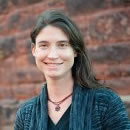
Richelle Winkler (SS) has received $14,148 from the Michigan Department of Natural Resources for a 26-month-long research project titled “Geographic Analysis of Age-Period-Cohort Dimensions in Michigan Deer Hunter Participation.”
From Tech Today

Richelle Winkler (SS) has received $14,148 from the Michigan Department of Natural Resources for a 26-month-long research project titled “Geographic Analysis of Age-Period-Cohort Dimensions in Michigan Deer Hunter Participation.”
From Tech Today
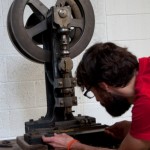 Daniel Schneider (M.S. graduate student in IA) was recently featured on the Hamilton Wood Type and Printing Museum news blog for his work in recording one of their vintage pieces of machinery. Schneider is doing his Master’s thesis on wood type manufacturing and skill as embodied by the workers at the Hamilton Manufacturing Company in Two Rivers, WI, which was the nation’s largest wooden type producer until it closed in the 1980s.
Daniel Schneider (M.S. graduate student in IA) was recently featured on the Hamilton Wood Type and Printing Museum news blog for his work in recording one of their vintage pieces of machinery. Schneider is doing his Master’s thesis on wood type manufacturing and skill as embodied by the workers at the Hamilton Manufacturing Company in Two Rivers, WI, which was the nation’s largest wooden type producer until it closed in the 1980s.
As part of that work Schneider is recording and rehabilitating an antique border-stamping machine (seen at left) in the museum. The machine was used to make the ornamental borders for newspaper advertisements and individual letterpress printers, and although the machine and some of its stamping dies remain in the museum along with samples of border it cut, there are no former operators who can explain the subtleties of the machine and its operations. Later this fall, Schneider will get the machine working again, experiment with it, and then in the winter and spring give weekend demonstrations at the museum. He expects to finish his thesis in summer 2015.
See the full Hamilton post at “Drawing a Machine“
 From TechToday (4 Sept.)
From TechToday (4 Sept.)
Carol MacLennan (SS) will offer remarks and slides on her recently published book, Sovereign Sugar: Industry and Environment in Hawai’i (Univ. of Hawai’i Press, 2014), on Wednesday, Sept. 10 Tuesday Sept. 30 (note new date!), in the East Reading Room of the Van Pelt and Opie Library. The book unravels the tangled relationship between the sugar industry and Hawai’i’s cultural and natural landscapes. MacLennan’s publication is the first work to fully examine the complex tapestry of socioeconomic, political and environmental forces that shaped sugar’s role. Join us for Hawai’i-inspired refreshments at 4 p.m. with remarks to begin at 4:15 p.m.
This event is part of the library’s “Nexus: the Scholar and the Library” series. All faculty and academic staff are encouraged to be a part of this series. Contact Ellen Seidel (eseidel@mtu.edu) to discuss how you can share your on going research or scholarly achievements with the campus.
 Richelle Winkler (SS) and Joshua Pearce (MSE/ECE) coauthored “Evaluating the Geographic Viability of the Solar Water Disinfection (SODIS) Method by Decreasing Turbidity with NaCl: A Case Study of South Sudan,” published in the journal Applied Clay Science.
Richelle Winkler (SS) and Joshua Pearce (MSE/ECE) coauthored “Evaluating the Geographic Viability of the Solar Water Disinfection (SODIS) Method by Decreasing Turbidity with NaCl: A Case Study of South Sudan,” published in the journal Applied Clay Science.
Globally, about one billion people don’t have access to clean drinking water. One cheap and easy method of cleaning water for consumption is to put it into plastic water bottles and set it in the sun (SODIS), but this method doesn’t work when the water is muddy. Pearce and his graduate students found that by adding simple table salt to water muddied with clay, the clay would settle the water enough to allow the SODIS method to work. Winkler worked with a graduate student at Princeton University on demographic analysis of the number of people who could potentially benefit from this salt+SODIS approach in Africa. The demographic team used a geographic information system (GIS) to identify geographic regions with the appropriate soil type, then overlaid that data with population estimates. They found that over a million people in South Sudan, a country where access to clean water is limited, could potentially benefit from this method.
Read the full article here.

Richelle Winkler was recently awarded a Phase 1 grant from the Environmental Protection Agency’s P3 (People, Prosperity, and Planet) program to supervise an interdisciplinary team of students to develop a guide that former mining communities can use to self-evaluate the feasibility of tapping into water in abandoned mines for geothermal energy. The student design team, led by Environmental and Energy Policy MS student Edward Louie, will present their guide at the Sustainable Design Expo in Washington DC in April 2015 and compete for a Phase 2 award of $90,000 to implement the project. Social science students are partnering with an Alternative Energy Enterprise team led by Jay Meldrum (Michigan Tech’s Keweenaw Research Center) on this project. The full team is also working closely with a community advisory board made up of leaders in the Calumet, MI community. It was Calumet community members partnering in Winkler’s community-engaged research with Main Street Calumet that started the idea for this project.

The Sustainable Sites Initiative—a program designed to ensure that built environments are planned, designed, developed and maintained as healthy, functioning landscapes—has awarded a one-star designation to the West Point Foundry Reserve in Cold Spring Harbor, N.Y. The foundry is the site of several years of research and a number of graduate theses in the Department of Social Sciences’ Industrial Archaeology Program. The conversion was also overseen by a MTY-IA graduate. See West Point Foundry.
The foundry rehab was also recently noted in the National Trust for Historic Preservation’s Preservation magazine in an article entitled, “Industrial Strength: Cold Spring, N.Y.,” as well as in Hudson Valley Magazine, in an article, “History and Preservation of the West Point Foundry in Cold Spring.”

Richelle Winkler, Assistant Professor of Sociology and Demography, was cited in a recent article published in The Boston Globe for her research on age segregation. Her work has shown that effects of segregation by age can be as profound as those of more widely-understood racial segregation.
Read the full story in the article entitled, What ‘age segregation’ does to America. From grade schools to senior villages, we now spend much of our lives on separate generational islands. Can we reverse the trend?
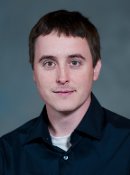
The National Science Foundation (NSF) has awarded $330,000 for a three-year project to Daisuke Minakata (PI: Civil & Environmental Engineering) and Mark Rouleau (Co-PI: Social Sciences) for a project on “Coupling Experimental and Theoretical Molecular-Level Investigations to Visualize the Fate of Degradation of Organic Compounds in Aqueous Phase Advanced Oxidation Systems.” Rouleau’s contribution will be to design and implement an agent-based computer simulation to forecast the fate of organic compounds during the process of waste water treatment. His goal is to develop a simulation that will be capable of “grading” treated waste water for potential chemical contaminants prior to public reuse. For the full abstract see NSF Award Abstract #1435926.

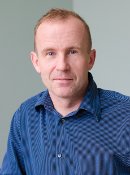
Assistant Professor Adam Wellstead has written an article on “Comparing Sub-National Policy Workers in Canada and the Czech Republic: Who are they, what they do, and why it matters?” The article, written with co-authors Arnošt Veselý (Charles University in Prague) and Bryan Evans (Ryerson University, Toronto), appears in Policy and Society 33.2 (2014): 103–115.
From the abstract:
This article compares profiles and policy-related activities of policy workers in 13 Canadian provinces and territories with PWs in the Czech Republic regions. In the two countries the proportion of men and women is similar and PWs are equally highly educated. [However,] when compared with the Czech PWs, Canadian PWs tend to be older, more often having social science educational backgrounds, more frequently recruited from academia, stay in a single organization for a shorter period of time and anticipate staying in their current position for only a short time. Canadian PWs are much more involved in evidence-based work, especially in evaluation and policy research. They also deal more with policy analysis activities such as identification of policy issues and options. In contrast, Czech PWs are more engaged in consulting with the public and briefing managers and decision-makers.
Download a pdf copy of the article at ScienceDirect.
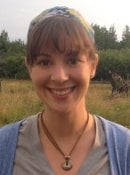
Chelsea Schelly, assistant professor of sociology in Social Sciences, has had her article on “Are Residential Dwellers Marking and Claiming? Applying Concepts to Humans Who Dwell Differently” appear in Environment and Planning D: Society and Space 32(4) 672-688.
From the abstract:
the typical and mainstream modern home dweller is contrasted with several different empirical case studies of people who dwell differently, using alternative technologies, practices, and forms of organization in residential dwelling.
Read the Full Abstract at EPD: Society and Space